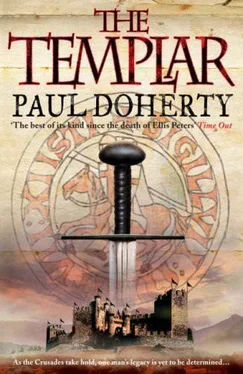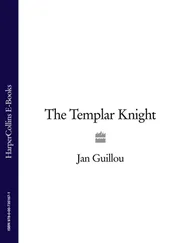P. Doherty - The Templar
Здесь есть возможность читать онлайн «P. Doherty - The Templar» весь текст электронной книги совершенно бесплатно (целиком полную версию без сокращений). В некоторых случаях можно слушать аудио, скачать через торрент в формате fb2 и присутствует краткое содержание. Год выпуска: 2010, ISBN: 2010, Издательство: Minotaur Books, Жанр: Исторические приключения, на английском языке. Описание произведения, (предисловие) а так же отзывы посетителей доступны на портале библиотеки ЛибКат.
- Название:The Templar
- Автор:
- Издательство:Minotaur Books
- Жанр:
- Год:2010
- ISBN:9780312576837
- Рейтинг книги:5 / 5. Голосов: 1
-
Избранное:Добавить в избранное
- Отзывы:
-
Ваша оценка:
- 100
- 1
- 2
- 3
- 4
- 5
The Templar: краткое содержание, описание и аннотация
Предлагаем к чтению аннотацию, описание, краткое содержание или предисловие (зависит от того, что написал сам автор книги «The Templar»). Если вы не нашли необходимую информацию о книге — напишите в комментариях, мы постараемся отыскать её.
The Templar — читать онлайн бесплатно полную книгу (весь текст) целиком
Ниже представлен текст книги, разбитый по страницам. Система сохранения места последней прочитанной страницы, позволяет с удобством читать онлайн бесплатно книгу «The Templar», без необходимости каждый раз заново искать на чём Вы остановились. Поставьте закладку, и сможете в любой момент перейти на страницу, на которой закончили чтение.
Интервал:
Закладка:
At last they reached the meeting place between the tents and the horse lines, a stretch of frozen grass now lit and warmed by scattered roaring fires, flames crackling greedily at the dry thorn and bracken. In the centre of this ring of fire stood a cart from which the Poor Brethren’s banner floated on a pole. Beltran, Hugh and Godefroi standing behind him, grasped the side rails of the cart and gestured at them to draw closer. They did, though Eleanor, like the rest, also tried to position herself to catch some warmth from the fires. Beltran blew on a hunting horn, stilling the clamour. He had a powerful voice and had quickly assumed the role of being their herald and news-bringer. He stood silently for a while, then delivered his message like an actor in a play or a troubadour reciting a poem. Hugh and Godefroi looked very grim; Eleanor caught her brother’s eye, but he simply shook his head and glanced away. At first, the news was good.
‘Other armies of cross-bearers,’ Beltran declared, ‘are moving east. Indeed, some are already approaching Constantinople. The Franks of the west are on the move accompanied by wondrous signs,’ he added. ‘Mysterious flocks of birds have been seen forming in the sky, pointing to the east, whilst some talk of a sacred goose that will lead them to Jerusalem.’ Beltran paused as the crowd laughed and shook their heads. He then pressed ahead with his other news. He described how the men of northern France and Germany had been eager for standards to tramp behind. Some of the great princes of Europe had emerged to lead them. Godfrey of Bouillon was such a man, a true warrior. He and his two brothers, Baldwin and Eustace of Boulogne, who owned swathes of estates across northern France and the Rhineland, would also join them in Constantinople. Philip I of France had been eager to go but could not because he had been excommunicated for his infatuation with another man’s wife. Instead Philip had sent his brother, Hugh of Paris, with two other warriors, Baldwin of Hainault and Stephen of Blois. These had been joined by the red-haired, green-eyed Robert of Normandy, nicknamed ‘Short-breeches’, brother of Rufus, the Red King of England, both sons of the Great Conqueror. These lords had collected as many men as they could and taken to the roads, escorted by their households, their greyhounds, lurchers and falconers running alongside them, a glorious cavalcade journeying to Jerusalem. More news was flowing in. How Bohemond of Taranto, the Norman adventurer from southern Italy, also intended to march with his warlike nephew Tancred. God was surely with them!
‘Nor is it just the lords,’ Beltran explained after a brief pause. ‘The People’s Army, under its leader Peter the Hermit and his lieutenant Walter, Lord of Boissy Sans-Avoir, nicknamed “Walter Sans-Avoir” — Walter Without Anything — have already clashed with the Turks — though with disastrous results. Peter’s message is simple,’ Beltran hastily explained. ‘We must take the road to the Holy Sepulchre, rescue Christ’s fief and rule over it ourselves. Such a land, flowing with milk and honey, was given by God to the children of Israel. Now we have inherited it ourselves, we must seize it from our enemies. We must take possession of their treasuries and either return home victorious or go to eternal glory blessed and purpled with our own blood…’
Beltran paused. People began shouting questions about Peter. Beltran replied that little was known about the hermit. Peter had possibly been born near Amiens. A poor man, he dressed only in a grey woollen robe with a hood pulled over his head. He rode a mule, his bare feet hanging down loose as he preached the taking of the cross. The hermit was dark of face, burnt black by the sun; he ate and drank nothing except a little fish, bread and some wine. According to Beltran, he was a passionate preacher whose tongue had been blistered by the Holy Spirit, a brilliant orator who, despite his shabby appearance, could persuade the most beautiful and noble women to lay their treasures at his feet. They even cut off hair from his donkey as sacred relics, and regarded Peter’s bath water as a holy elixir. Beltran paused to slurp noisily from a goblet of wine. Eleanor wondered if their herald was quietly mocking this common preacher who had stirred up so many to follow the cross. She glanced at Hugh; he stood, arms crossed, staring down at the wooden slats of the cart.
Beltran continued. According to one story, Peter had visited the Holy Sepulchre to witness first hand the violence of their enemies. Whilst in Jerusalem, he had also fallen into a trance and experienced a vision of the Lord Jesus, who had told him, ‘You will receive a letter for your mission from heaven bearing the seal of a cross.’ Peter claimed to hold such a heavenly letter, which was how he had swept through the Frankish kingdoms, exhorting all to follow the cross — not just the lords, but the forgotten and dispossessed. According to Beltran, orange-wigged whores, bejewelled pimps, catamites, counterfeits, cripples, vagabonds, adulterers, soul-killers, fornicators, perjurers and outlaws surged from the dank slums of the towns to mingle with his army of artisans, labourers, knights from Picardy, axe-men from Swabia and swordsmen from Cologne. Again Beltran paused to drink, smacking his lips in relish. Eleanor’s stomach clenched. Beltran was a cynical soul. He was openly scoffing at those poor cross-bearers, and she suspected the story he was telling would end not in triumph but disaster. Beltran, however, now had them all spellbound and they drew closer. The herald described how the great People’s Army, almost sixteen thousand souls, had surged across Germany threatening the Jews, extorting monies from these unfortunates before they assembled to hear Mass in hedge-Latin and chant their popular hymns. Peter’s horde had then left Germany, following the Danube through the kingdom of Hungary, watched from afar by the Hungarian king’s sheepskin-coated scouts on their swift ponies. The Hungarians, Beltran declared, were wise to be cautious. Coloman, their king, was wary of this long column of carts and horses and the unruly throng streaming across his kingdom beneath a host of crosses and tattered, brilliant banners.
The People’s Army had expected to travel safely and securely, but whilst crossing the Danube, they were attacked by Patzinacks, Turkish mercenaries, mounted archers from the steppes hired by Alexius Comnenus, Emperor of Constantinople, to serve as police along his borders. A bitter battle ensued, during which German knights on a fleet of rafts attacked a flotilla of Patzinacks and beat them off. They captured some of these mercenaries and brought them before Peter. He immediately ordered their decapitation along the banks of the Danube and left their severed heads tied to the branches of trees as a warning to the rest.
Peter and his army, Beltran explained, then crossed the Danube into Alexius’ territories and reached the city of Nish. Here the imperial governor promised them supplies and safe conduct to Constantinople. However, when some of the more fiery of Peter’s lieutenants discovered that their advance guard under Walter Sans-Avoir had been badly cut up in a forest fight, they turned back to burn and pillage the suburbs of Nish. Imperial police shadowing the People’s Army lost patience, and a furious woodland battle ensued. During this savage mêlée, thousands of Peter’s followers simply disappeared. Afterwards, the cross-bearers continued their march, escorted by fierce mounted archers, who shepherded them as dogs would sheep. However, if any of the marchers wandered off the beaten track, these dogs became wolves, taking heads and fastening the grisly trophies to their saddle horns.
At last, Beltran declared triumphantly, the People’s Army reached Constantinople. The cunning Emperor Alexius had them camped on the eastern side of the city near the Golden Gate and sent out carts heaped with supplies to feed them. Peter’s horde, relaxed and refreshed, immediately turned their attention to the wealth of Alexius’ city. The many thieves and vagabonds amongst them could not resist the temptation to loot; they even climbed on to church roofs stripping off the lead to sell to city merchants. The Emperor decided to move them across the straits known as the Arm of St George into Anatolia, the kingdom of the Sultan of Rhum, Kilij Arsan, who called himself ‘the Sword of the Spirit’. Here the People’s Army rejoined their advance guard under Walter Sans-Avoir who had taken up residence in a deserted fortress near Civetot.
Читать дальшеИнтервал:
Закладка:
Похожие книги на «The Templar»
Представляем Вашему вниманию похожие книги на «The Templar» списком для выбора. Мы отобрали схожую по названию и смыслу литературу в надежде предоставить читателям больше вариантов отыскать новые, интересные, ещё непрочитанные произведения.
Обсуждение, отзывы о книге «The Templar» и просто собственные мнения читателей. Оставьте ваши комментарии, напишите, что Вы думаете о произведении, его смысле или главных героях. Укажите что конкретно понравилось, а что нет, и почему Вы так считаете.












